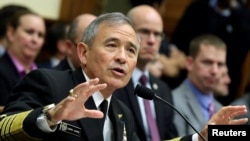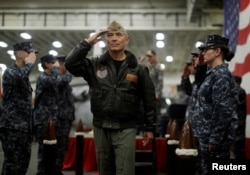U.S. President Donald Trump appears to be looking to the military to fill yet another senior post in his administration, according to reports published Wednesday.
Citing three unnamed officials, The Washington Post said Admiral Harry Harris, commander of the U.S. Pacific Command, is being considered for appointment as the next U.S. ambassador to Australia.
Nominating the Pacific Command's top flag officer to be U.S. ambassador in Canberra would mean another high-profile Trump administration position likely would be held by a member of the U.S. military's most senior cadre, known as general and flag officers. Active-duty or or retired generals already serve the president as defense secretary, national security adviser and White House chief of staff.
'Knows Australia well'
No decision has yet been made, The Post said, but Australian officials said they would be delighted to see Harris installed as the next U.S. representative in Canberra.
Australia's foreign minister, Julie Bishop, said Harris is “a very capable, competent man who knows Australia well.” Bishop said her most recent encounter with Harris was in Sydney during bilateral ministerial discussions in June.
Harris has led the U.S. Pacific Command, or USPACOM, since May 2015. Headquartered in Hawaii, it is one of six unified commands responsible for members of all U.S. military branches from the west coast of the United States to India, and from the North Pole to Antarctica — about half the Earth's surface, including 36 nations with about half the world's population.
USPACOM has not commented on reports of Harris's possible appointment, of course, but the command's official social media page has retweeted the admiral's thoughts last year about the alliance between the United States and Australia: "Australia-US alliance matters it matters to our two great nations, it matters to the Indo-Asia-Pacific region, and, in my opinion, it matters to the world. No one should doubt the power of this staying alliance to maintain security, prosperity and peace."
Harris was speaking in December to the Australian think tank the Lowy Institute, which featured his remarks on the front of its website Wednesday.
Harris is widely reported to hold tough positions on China, a country key to both the United States and Australia, both strategically and economically. He is known to have described China's actions in the contested South China Sea as building a “Great Wall of Sand.”
Japan's Kyodo News reported in May that China's ambassador to the U.S. requested that Harris be removed from his command post as a condition for Beijing's help on North Korea. The Washington Post reported that a similar request was made to President-elect Trump's transition team after last year's U.S. elections.
Hawkish credentials questioned
Chinese officials in Washington and Beijing have denied they made such requests.
However, the admiral's hawkish credentials have been questioned by some military observers and analysts who follow issues relating to China.
Anders Corr, principal at Corr Analytics, a New York-based consultancy, has worked as a contractor for USPACOM on intelligence-planning matters. He told VOA that Harris was a supporter of former President Barack Obama's strategy of engagement with China, when “he should have known” that “engagement was a failing strategy.”
Corr said Harris “is in no way a ‘China hawk,’ as reported elsewhere."









